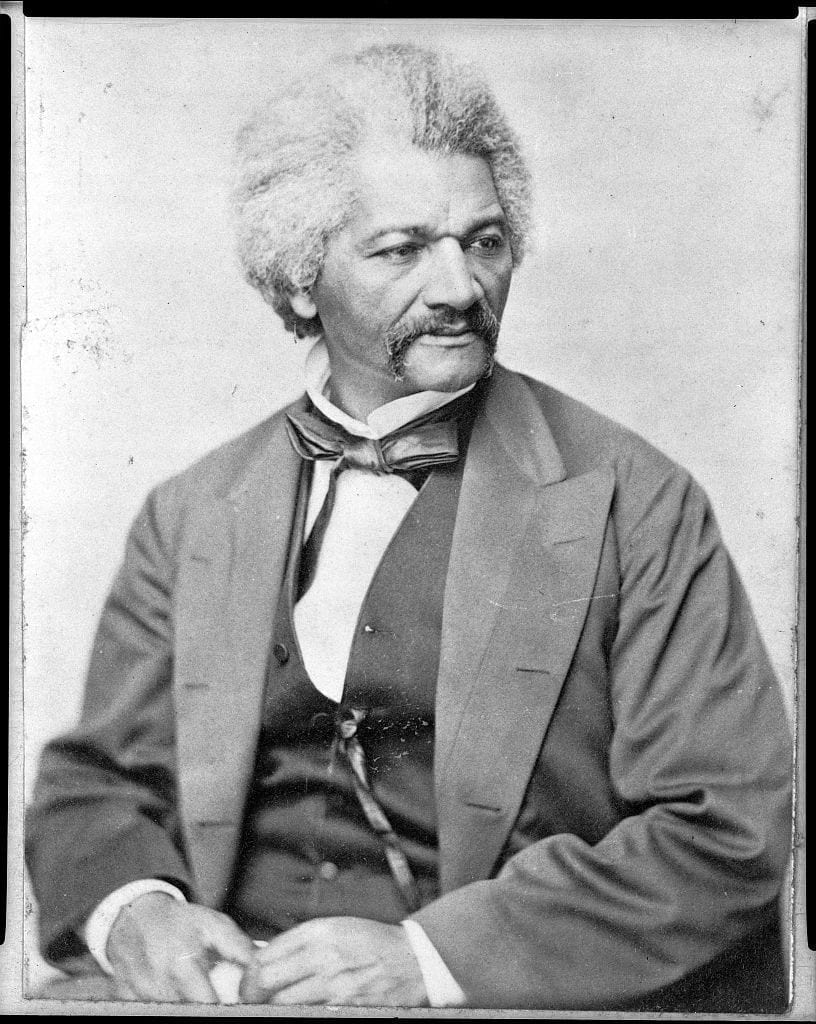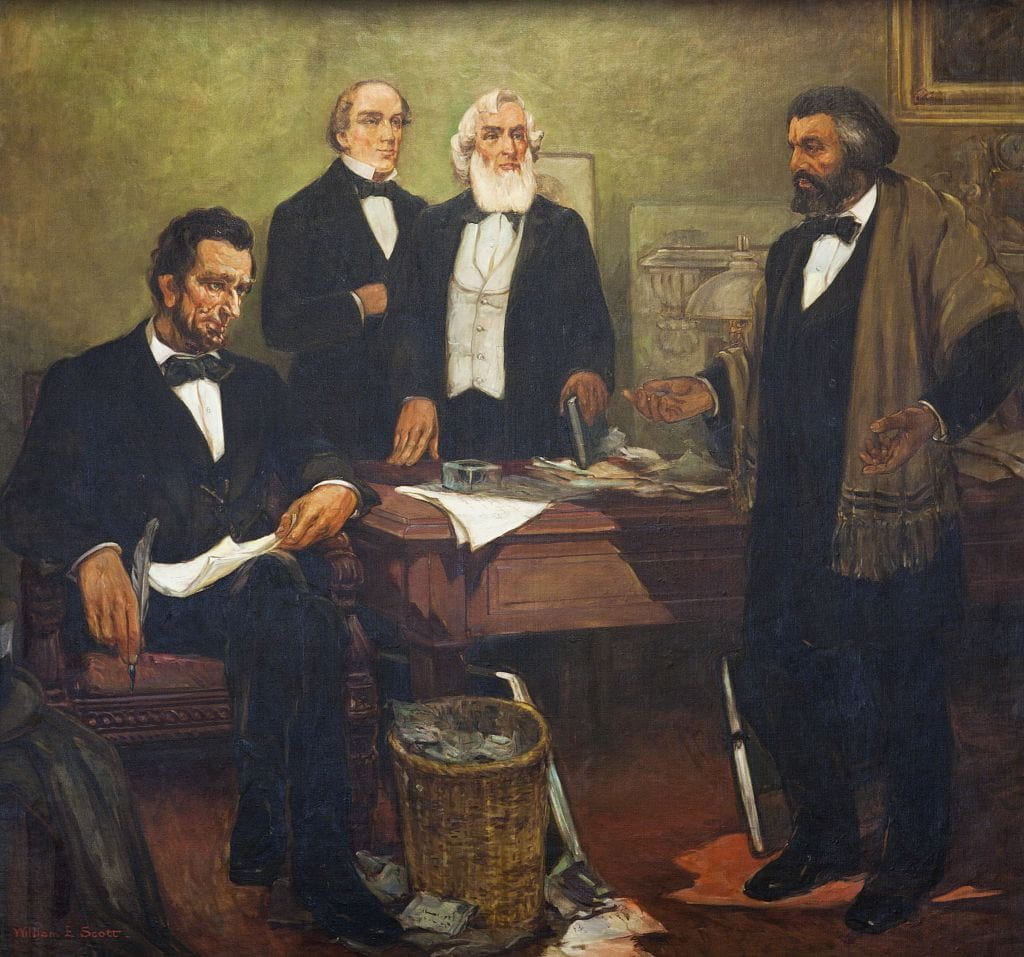
Today is the last day of Black History Month… and what a month it has been. This blog is a nod to Frederick Douglass, who received a mention during a meeting earlier this month.
Frederick Douglass was born a slave in 1818. In 1848, ten years after his escape to freedom, he penned a letter to his white owner, Thomas Auld, who historians believe to be his father, regarding the reality that the determination to run away arose in him at six years old. In the letter, he vividly describes the moment in which he “attempted to solve the mystery, Why am I a slave?”
“… I was puzzled with this question, till one night, while sitting in the kitchen, I heard some old slaves talking of their parents having been stolen from Africa by white men, and were sold here as slave. The whole mystery was solved at one… From that time, I resolved that I would some day run away. The morality of the act, I dispose as follows: I am myself; you are yourself; we are two distinct persons, equal persons. What you are, I am. You are a man, so am I. God created both, and made us separate beings. I am not by nature bound to you, or you to me. Nature does not make your existence depend on me, or mine to depend upon yours… In leaving you, I took nothing but what belonged to me, and in no way lessened your means for obtaining an honest living…”
Historian Eric Foner writes that although Douglass was a slave, Lucretia Auld–wife of Thomas–taught him to read and write until he forbade her, in accordance with Maryland law at the time. Douglass secretly continued his education with the help of some white children. In the South, the peculiar institution of slavery received elaborate justification from Christians willing to employ and misrepresent the scriptures in order to continue the dehumanizing treatment of African and American blacks, created by God, under the guise of inferiority and barbarianism. De Bow’s Review, published in 1850, states “…a very large part in the United States believe that holding slaves is morally wrong; this party founds its belief upon precepts taught in the Bible, and takes that book as the standard of morality and religion. We, also, look to the same book as out guide in the same matters; yet, we think it right to hold slaves—do hold them and have held and used them from childhood. We find, then, that both the Old and New Testament speak of slavery—that they do not condemn the relation, but, on the contrary, expressly allow it or create it… It cannot, then, be wrong.”
Wolfgang Mieder points out that when his education was taken from him as a child, Douglass “very consciously chose” to study and memorize material that would become useful as an adult. As a statesman, his mastery of the English language and his knowledge of the scriptures became a method of rebuke, persuasion, and a declaration of reversal of fortune. For Douglass, the biblical references provided an added authority and wisdom as morality and religion were one in the same. Mieder summarizes Douglass’ speeches and writings as an identifiable narrative, fought against slavery and injustice through the raising of a powerful voice that argued for the “strength of morality, equality, and democracy.”
Frederick Douglass observed a disconnection between the words of the Declaration of Independence: “we hold these truths to be self-evident, that all men are created equal, that they are endowed by their Creator with certain inalienable rights” and the treatment of blacks as a byproduct of slavery. He believed that from a political and personal standpoint, under natural law, every person possesses the same rights as another, and owed the honoring of those rights by another under God. Nicholas Buccola concludes that Douglass’ personal experience as a slave in the South then a free man in the North, shaped his worldview and belief that the promise of liberty has to belong to all or it belongs to none. He states that individualism negates the feeling of and the need for empathy, making it difficult to persuade another about the plight of someone who is not and never considered a neighbor. In other words, the sense of brotherhood is made obsolete because of individualism.
According to Leslie Friedman Goldsmith, Douglass “put his hopes in the press and pulpit for the moral education of America” while believing social reform would take place in politics as those in government became more concerned with the establishment of justice and the advancement of common good, rather than “the greedy quest for the material fruits of public office.” Douglass’ advocacy, as a member of a minority group, grew from a place of mutual understanding that the lack of moral responsibility finds correction in the adaption of moral obligation. Therefore, he focused on the role of the individual as a perpetuator of injustice or protector of human rights. By appealing to the empathic core—the soul–of an individual, Douglass hoped for a synergistic catalyst towards the eradication of slavery, and the humanization of blacks, whether free of enslaved, in America. As a result, under President Abraham Lincoln, the Emancipation Proclamation in 1863 and the abolishment of slavery and involuntary servitude of the 13th amendment brought about a possible future for blacks in America.

Civil equality was a fundamental platform for Frederick Douglass as he championed for the women’s rights, abolition of slavery, and the right to vote. Despite the victories of 1863, the true freedom of blacks remained his primary mission. Douglass demanded the extinction of racial prejudice and the false belief that the African lineage of black Americans disqualified them from the same rights as white Americans. Daniel Kilbride states that Douglass’ stance on Africa during his lifetime is similar to Countee Cullen’s questioning poem, Heritage during the Harlem Renaissance. He concludes that Frederick Douglass “treasured the values and institutions of the USA and insisted that the free enjoyment of them was a birthright of Americans of African descent.” It is imperative to understand that Douglass did not deny his ancestry; he accepted the discourse as irrelevant given the fact he was born in America.
During the late 1840s, the women’s movement was on the rise due to persistence of Elizabeth Cady Stanton, Susan B. Anthony, and Lucretia Mott, among others. When Stanton formulated and organized the Seneca Falls Convention in 1848, Frederick Douglass was on the platform as a main speaker. More specifically, he was the only male and person of color in support of women rights to equality, including the right to vote. Douglass summarized the convention in an 1848 North Star editorial article: “Many who have at least made the discovery that the Negroes have some rights as well as other members of the human family, have yet to be convinced that women are entitled to any. While it is impossible for us to go into this subject… Our doctrine is that ‘right is of no sex’”. Benjamin Quarles narrates the delicate interplay of Douglass’ personal friendship and political partnership with the women’s movement. Quarles notes the Reconstruction Era as the turning point in Douglass’ partnership with the women’s movement, as the question of what group deserved the right to vote first: blacks or women. “To women the vote is desirable; to the black, it is vital”, he pronounced. For Douglass, blacks as a people before women as a gender. He lamented in 1883, “for no where, outside of the United states, is a man denied civil rights on account of his color.” The recognition of blacks though the casting of votes was an “urgent necessity” post-Emancipation Proclamation.
Relevance for 2017
Frederick Douglass died in1895, yet his life, words, and legacy are still relevant for today. Earlier this month, Donald Trump mentioned Frederick Douglass as “an example of somebody who’s done an amazing job and is being recognized more and more.” Interestingly enough: if Douglass were alive, the recognition could come in both positive and negative forms as he questioned and challenged slavery, prison reform, women’s rights, and all lives matter. The employment of the Scriptures as a justification for the present value and identity crisis taking place in America, given the values forfeiture of liberty and justice for all, in exchange for individualism, isolation, and rhetoric would undergird his critique.
First, human trafficking, in the form of sex and labor, is a new form of an old method. Kevin Bales suggests slavery failed to disappear in the 1860s because trade of people, through means of exploitation, has increased with modernization and globalization. He elucidates the subject of disposable people by informing that human trafficking is not a long-term cost investment due to high supply and high demands. The benefits of “ownership” have waned while the profits from slave trade dramatically increases because whether it is sex in Thailand or Brazil, tomatoes in Florida or chocolate from Ivory Coast, or the FIFA World Cup stadium in Qatar, slave laborers will be exploited in order to ensure the needs of consumer are met. Second, America has the highest incarceration population in the world. According to Bryan Stevenson, there is something missing from the judicial system, specifically in our treatment of the condemned, incarcerated, and those judged unfairly. The American prison system, as means to dehumanize human beings, particularly black Americans in 13th by Ava DuVernay and The New Jim Crow by Michelle Alexander, systemically removes human rights and destroys families. Former President Barack Obama implemented some justice reform, resulting in the commutation of thousands of non-violent offenders. Third, Frederick Douglass would be an advocate for HeForShe. As a feminist, Douglass would question why men have consumed the decision making power about women, from pay to maternity leave and healthcare rights, without consulting them, or at the very least, having them present when signing laws about their personhood. Finally, America’s treatment of her citizens—the marginalized because of race, ethnicity, sexual orientation or identity, and ability—the blatant denial of human rights while championing all lives matter and pro-life. The plight of marginalized Americans remains trapped under the thumb of the majority, whereas the words of Douglass’ The Claims of Our Common Cause apply:
“…A heavy and cruel hand has been laid upon us. As a people, we feel ourselves to be not only deeply injured, but grossly misunderstood. Our white country-men do not know us. They are strangers to our character, ignorant of our capacity, oblivious to our history and progress, and are misinformed as to the principles and ideas that control and guide us as a people. The great mass of American citizens estimates us as being a characterless and purposeless people; and hence we hold up our heads, if at all, against the withering influence of a nation’s scorn and contempt. It will not be surprising that we are so misunderstood and misused when the motives for misrepresenting us and for degrading us are duly considered.”
In 1853, our common cause stood as a pronouncement, emphasizing the misunderstanding and misrepresentation of the marginalized, specifically blacks. Today, our common cause stands as a banner to those in power and opposed to change because of prejudice. The banner signifies the past while embracing the fullness offered in those presently dismissed–doctors, farmers, merchants, teachers, ministers, lawyers, editors, etc.–American citizens who, through unity and belief in the foundational values of this country, fought and fight against every perpetuation of injustice “with pride and hope”.
Additional resources:

